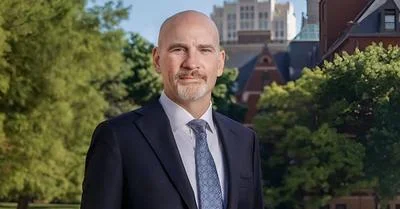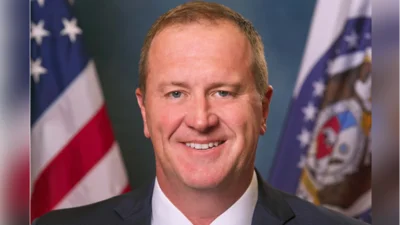Tom Schatz, president, Council for Citizens Against Government Waste, left, and Connie Farrow, executive director, Patients Come First-Missouri | CAGW.org / Patients Come First
Tom Schatz, president, Council for Citizens Against Government Waste, left, and Connie Farrow, executive director, Patients Come First-Missouri | CAGW.org / Patients Come First
Citizens Against Government Waste (CAGW) said that hospitals and other “special interests,” rather than patients, are benefiting from a federal drug discount program in which up to 69 Missouri hospitals participate.
“Taxpayers are footing the bill for the 340B Drug Pricing Program—while hospitals, contract pharmacies, and special interest sharks profit,” CAGW posted on X. “They’re taking advantage of 340B discounts meant for patients, and it’s costing taxpayers millions.”
"The 340B program must strongly define patient eligibility and enforce strict accountability measures to enhance transparency," said a CAGW website to which the X post linked.
Established in 1992 and administered by the Health Resources and Services Administration (HRSA) the program aims to provide financial relief to healthcare providers serving vulnerable populations, allowing them to stretch their scarce resources and reach more eligible patients.
Hospitals participating in the 340B program can use the savings to fund essential services and programs, such as free or low-cost medication assistance, expanded access to healthcare, and community outreach initiatives.
In Missouri, 69 hospitals participate in the program, reported Show-Me State Times on February 27.
Participating hospitals, however, “often extend their 340B discounts to clinics in well-off communities, where they can charge privately insured patients more than those on Medicaid,” reported the Wall Street Journal.
“In some cases, the program appears to be bolstering profits in well-off areas more than it is underwriting services in less-privileged neighborhoods,” said the Journal article.
The executive director of Patients Come First - Missouri (PCF-MO) said there is “growing concern” that the 340b program isn’t passing along drug savings Missouri patients.
“There is growing concern that the federal program’s lack of oversight is allowing bad actors to turn around and charge patients higher prices and pocket the difference or use the profits to invest in unrelated programs,” wrote Farrow in a Missouri Times op-ed. “As they fund their own special interests, the most vulnerable patients are left unable to afford their medications.”
“This is contrary to the program’s intended purpose.”
Dr. Anthony DiGiorgio, a neurosurgeon and senior affiliated scholar at the Mercatus Center at George Mason University, told Show-Me State Times that drug discounts often aren’t passed along from the hospitals to the patients.
“Because the discount is mandatory, many drugs come out with higher list prices than they normally would, but patients pay that copay at the higher list price,” he said. “Patients are actually paying more than they otherwise would if the 340b program didn't exist.”
Naomi Lopez, senior fellow at The Goldwater Institute, said “we don’t actually know” if drug discounts are being passed to patients by organizations participating in the 340b program, reported Show-Me State Times on April 10.
“The real problem is that we don't know if they're making a huge profit, where those profits are going, or if those funds are actually going to care for the low income indigent population,” said Lopez. “We're definitely looking at billions of dollars, and we don't actually know because of the lack of transparency and accountability in the program.”
If those discounts aren’t reaching patients, wrote Farrow, “the program is not functioning as it should.”
“Access to affordable medicines is critical, especially to the impoverished in underserved communities that the 340B program was intended to help,” she wrote. “Patients on the receiving end of this program already face significant barriers to care, including being able to afford treatments, residing in rural communities with fewer care facilities and various adverse health outcomes.”
The U.S. House Energy and Commerce Oversight and Investigations Subcommittee held a June 4 hearing on the 340b program. U.S. Rep. John Joyce (R-PA-13) said in during the hearing that the program’s growth has created “misaligned incentives” that are driving up patient costs.
“This growth has created misaligned incentives across the entire health care system, leading to further consolidation that drives up prices for every patient,” said Joyce.





 Alerts Sign-up
Alerts Sign-up